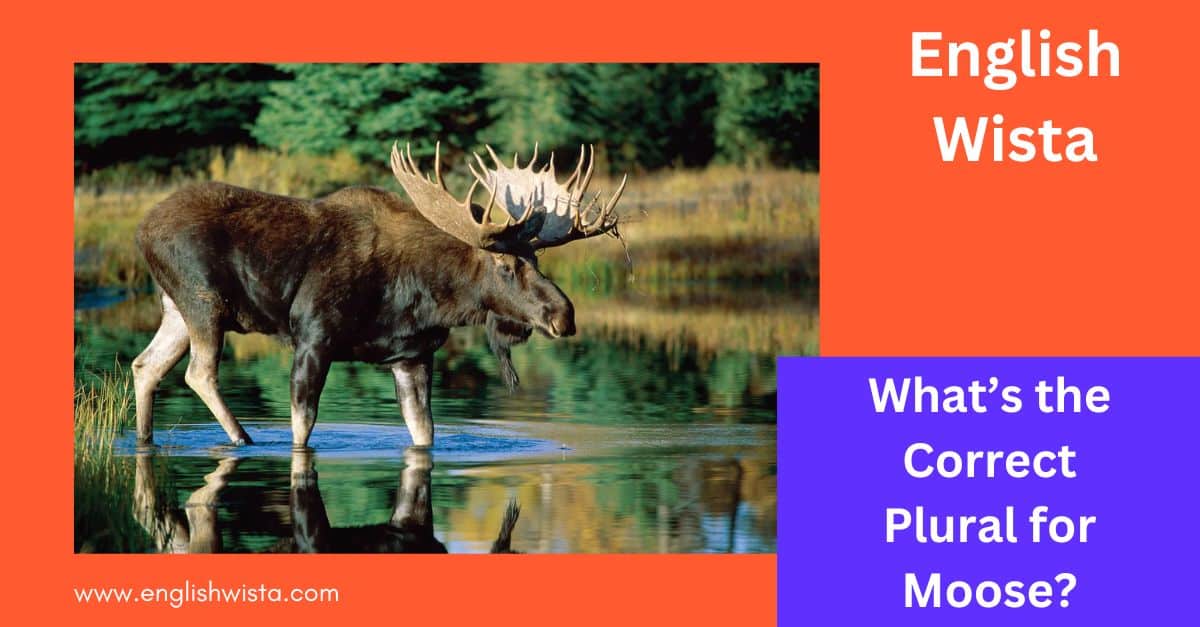What’s the plural for moose? If you’re scratching your head, you’re not alone. Unlike “goose” (which becomes “geese”), the plural of moose stays the same: it’s still “moose.” Strange, right? English can be quirky like that, and this little linguistic oddity has stumped many curious minds. But there’s more to the story than meets the eye.
Why doesn’t it follow the same rules as other animals? And what’s the deal with its origins? Stick around, and you’ll uncover the fascinating history and logic behind this one-of-a-kind word. Trust me—you’ll never look at moose the same way again!
What Is the Plural of Moose?
Let’s cut right to the chase: The plural of “moose” is moose. Yep, you read that correctly! It’s one of those rare English words that doesn’t change when it goes from singular to plural. Whether you’re talking about one moose or a group of them, the word stays exactly the same.
For example:
- “I saw a moose in the forest yesterday.”
- “We spotted five moose near the lake this morning.”
In both sentences, the word “moose” doesn’t change, even though the number of animals does. Strange, right? But don’t worry—there’s a reason for this!
Why Doesn’t “Moose” Follow the Usual Rules?
To understand why “moose” is its own plural, let’s take a quick trip back in time. The word “moose” comes from the Algonquian languages, spoken by Indigenous peoples in North America. Specifically, it’s believed to have roots in the Eastern Algonquian word moos or mos, which roughly translates to “twig eater.”
When English adopted the word, it kept its original form. Unlike many other English nouns, “moose” wasn’t influenced by Latin or Germanic language rules that often change singular words into plurals by adding an “-s” or “-es.”
Think of it this way: “Moose” came into English as a “borrowed” word, and it brought its own rules along for the ride. This is why the plural doesn’t follow the patterns you’re used to.
Is “Mooses” Ever Correct?
The short answer is no. Adding an “-s” to “moose” to make “mooses” is incorrect. It might sound tempting, especially since most English words form their plurals this way, but it’s not how this word works.
That said, “mooses” does pop up occasionally in jokes, cartoons, or informal speech. For example, someone might say:
- “Look at all those mooses!”
This is usually done for comedic effect. While it’s not correct in standard English, it’s still worth mentioning since you might hear it from time to time.
How Is “Moose” Different From “Goose”?
A common source of confusion is comparing “moose” to “goose.” After all, they rhyme, so shouldn’t their plurals work the same way? Not quite! The plural of “goose” is “geese,” but this is because “goose” follows an older pattern of pluralization in English that involves changing the vowel sound (like “foot” to “feet” or “tooth” to “teeth”).
“Moose,” as we mentioned earlier, doesn’t follow these patterns because it comes from a completely different linguistic background. So, while “geese” is the correct plural for “goose,” the plural for “moose” remains… just “moose.”
Real-Life Examples of “Moose” in Sentences
Let’s look at more examples to reinforce the idea:
- “A moose wandered into the backyard and startled everyone.”
- “The park ranger warned us about the moose in the area.”
- “During our trip to Alaska, we saw a herd of moose grazing by the river.”
- “Moose are fascinating creatures with their massive antlers and calm demeanor.”
Notice how the word “moose” doesn’t change, whether it refers to one animal or several.
Fun Facts About Moose
- Size Matters: Moose are the largest members of the deer family. A full-grown moose can weigh up to 1,500 pounds and stand over 6 feet tall at the shoulder. Talk about a big animal!
- Swimming Champions: Moose are excellent swimmers and can even dive underwater to eat aquatic plants.
- Antler Awe: Only male moose, called bulls, grow antlers. These antlers can spread up to 6 feet wide.
- Group Names: While the plural of “moose” is “moose,” a group of them is often called a “herd.” However, moose are typically solitary animals, so it’s rare to see them in large groups.
Words Similar to “Moose”
“Moose” isn’t the only English word that keeps the same form in both singular and plural. Here are a few others:
- Sheep: “I see one sheep in the field” and “I see ten sheep in the field.”
- Deer: “There’s a deer by the stream” and “There are many deer in the woods.”
- Fish: “I caught a fish today” and “We caught five fish yesterday.”
These words, like “moose,” are exceptions to the usual pluralization rules in English.
Common Mistakes to Avoid
Here are a few errors to watch out for:
- Don’t say “mooses.” It’s tempting, but it’s not correct.
- Don’t overthink it. Sometimes English rules are just quirky, and “moose” is a great example of that.
- Don’t confuse it with “goose.” Remember, “goose” becomes “geese,” but “moose” stays the same.
Quick Tips to Remember
- Singular: “moose”
- Plural: “moose”
- Group name: “herd of moose”
If you’re ever in doubt, just remember: “Moose” doesn’t change, no matter how many you’re talking about.
Conclusion: The Mystery of “Moose” Solved
The plural of “moose” might seem confusing at first, but it’s actually pretty simple once you know the rule. Unlike most English words, “moose” keeps the same form whether it’s singular or plural. This little quirk comes from its unique origins in the Algonquian languages.
So, the next time someone asks you about the plural of “moose,” you can confidently tell them, “It’s just moose!” Who knows—you might even impress them with a fun fact or two about these incredible animals. Happy learning, and keep exploring the wonders of the English language!



